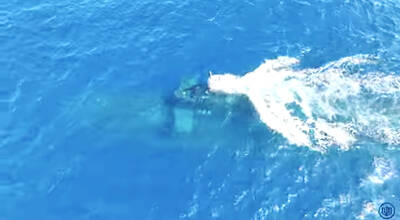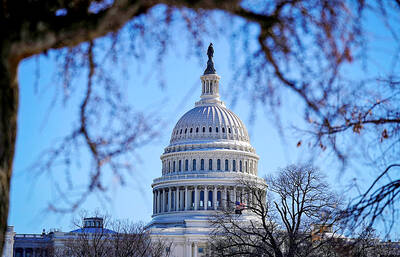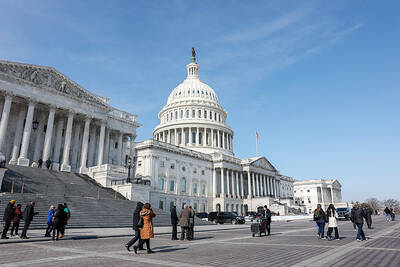Japanese retail sales unexpectedly fell in December for a second month, adding to concern that a tax increase will restrain consumer spending and growth in the world's second-largest economy.
Sales fell 0.5 percent, seasonally adjusted, from November, led by food and sporting goods, the Ministry of Economy, Trade and Industry said today in Tokyo. The decline compared with the median 0.4 percent increase forecast by six economists in a survey.
Consumers may further cut spending at retailers including Aeon Co because they are bracing to pay as much as 145,000 yen (US$1,404) in extra tax in the year starting April 1 under new rules. A drop in consumer spending, which makes up half the economy, might curb growth at a time when exports are flagging.
"The major issue for consumption in 2005 will be the impact of tax changes," said Glenn Maguire, chief economist for Asia at Societe Generale Australia Ltd in Sydney.
"It does have the potential to erode income growth and therefore depress consumption."
From a year earlier, retail sales fell 0.7 percent in December, today's report showed. Sales declined 0.6 percent in all of last year.
Tax breaks "retail sales are largely flat," said Naomichi Miyazawa, a trade ministry official. "Last year our assessment was they are showing signs of recovery."
Japan in April will halve income tax breaks worth as much as 290,000 yen, in place since 1999, to help trim the largest public debt in the world. The Ministry of Finance estimates debt will balloon to 151 percent of GDP by the end of next fiscal year. The lower tax rate is provided through a rebate paid every January.
"If you consider the knock-on effect, such as on employment, the tax increase could as much as halve Japan's potential 1 to 1.5 percent growth rate," Naoki Iizuka, chief economist at Dai-Ichi Life Research Institute, said before the release.
Growth in consumer spending slowed for a second straight quarter in the three months ended Sept. 30, expanding 0.9 percent.
Consumer confidence in December fell for the first time in three months as households grew more pessimistic about employment and wages, which have risen just six times in 48 months.
Exports Retails shares declined. The Topix Retail Trade Index fell 0.5 percent to 691.750 at 2:23pm in Tokyo, led by clothing store Fast Retailing Co and Aeon. The index has gained 47 percent in the past year.

CSBC Corp, Taiwan (台灣國際造船) yesterday released the first video documenting the submerged sea trials of Taiwan’s indigenous defense submarine prototype, the Hai Kun (海鯤), or Narwhal, showing underwater navigation and the launch of countermeasures. The footage shows the vessel’s first dive, steering and control system tests, and the raising and lowering of the periscope and antenna masts. It offered a rare look at the progress in the submarine’s sea acceptance tests. The Hai Kun carried out its first shallow-water diving trial late last month and has since completed four submerged tests, CSBC said. The newly released video compiles images recorded from Jan. 29 to

DETERRENCE EFFORTS: Washington and partners hope demonstrations of force would convince Beijing that military action against Taiwan would carry high costs The US is considering using HMAS Stirling in Western Australia as a forward base to strengthen its naval posture in a potential conflict with China, particularly over Taiwan, the Wall Street Journal reported on Saturday. As part of its Indo-Pacific strategy, Washington plans to deploy up to four nuclear-powered submarines at Stirling starting in 2027, providing a base near potential hot spots such as Taiwan and the South China Sea. The move also aims to enhance military integration with Pacific allies under the Australia-UK-US trilateral security partnership, the report said. Currently, US submarines operate from Guam, but the island could

RESTRAINTS: Should China’s actions pose any threat to Taiwan’s security, economic or social systems, China would be excluded from major financial institutions, the bill says The US House of Representatives on Monday passed the PROTECT Taiwan Act, which states that Washington would exclude China from participating in major global financial organizations if its actions directly threaten Taiwan’s security. The bill, proposed by Republican Representative Frank Lucas, passed with 395 votes in favor and two against. It stipulates that if China’s actions pose any threat to Taiwan’s security, economic or social systems, the US would, “to the maximum extent practicable,” exclude Beijing from international financial institutions, including the G20, the Bank for International Settlements and the Financial Stability Board. The bill makes it clear that China must be prepared

The partisan standoff over President William Lai’s (賴清德) proposed defense budget has raised questions about the nation’s ability to adequately fund its own defense, the US Congressional Research Service (CRS) said in a report released on Tuesday. The report, titled Taiwan: Defense and Military Issues, said the government has increased its defense budget at an average annual rate of 5 percent from 2019 to 2023, with about 2.5 percent of its GDP spent on defense in 2024. Lai in November last year proposed a special budget of about US$40 billion over eight years, and said he intends to increase defense spending to